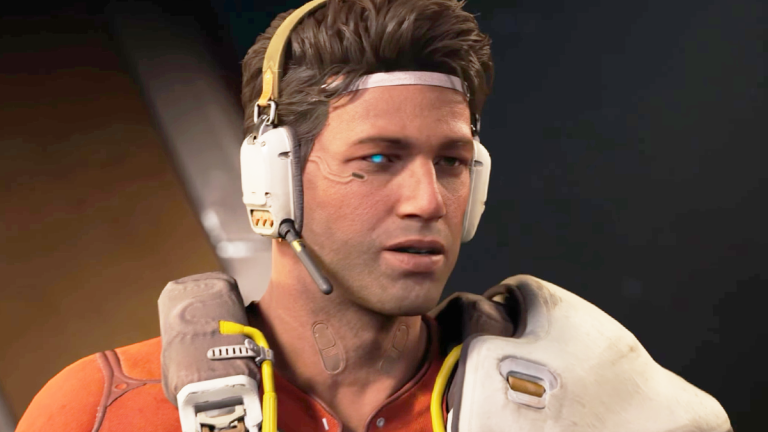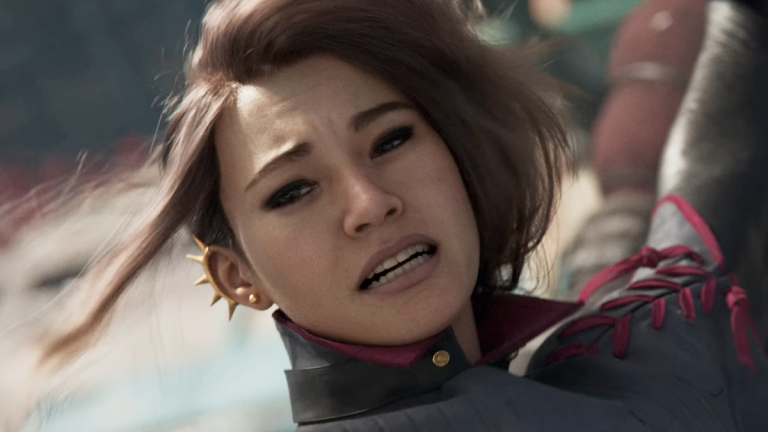 Star Child (Derek Mears) is surprised at his teammates’ resilience in Concord (2024), Firewalk Studios
Star Child (Derek Mears) is surprised at his teammates’ resilience in Concord (2024), Firewalk Studios
As if the game’s troubles weren’t already bad enough, a dev who purportedly worked on Concord has revealed that not only was the failed hero shooter far and wide Sony’s most expensive title to date, but that it was considered by higher-ups to be the ‘future’ of the PlayStation brand’s entire operations.
 Teo (Alan Pontes) is frustrated with his crew in Concord (2024), Firewalk Studios
Teo (Alan Pontes) is frustrated with his crew in Concord (2024), Firewalk Studios
These insights into Concord‘s disastrous development were first brought to light courtesy of Sacred Symbols host Colin Moriarty, who had learned of the information directly from a developer who actually worked on the game itself.
“Someone who worked on Concord reached out to me,” Moriarty told his fellow hosts Chris Ray Gun and Dustin Furman during an as-of-yet-unreleased episode of their show, a clip of which he shared directly to his own personal Twitter account, “and I verified who this person was and went through all that and talked to this person extensively, for a long time, and I got some interesting information that I can share about Concord.”
His disclaimer complete, Moriarty then explained, “the big that you really need to know here, about this, is that Concord cost about $400 Million dollars to make.”
I spoke extensively with someone who worked on Concord, and it’s so much worse than you think.
It was internally referred to as “The Future of PlayStation” with Star Wars-like potential, and a dev culture of “toxic positivity” halted any negative feedback.
Making it cost $400m. pic.twitter.com/F5O0oy4gaQ
— Colin Moriarty (@longislandviper) September 20, 2024
“The story goes that in the first quarter of 2023, Concord had basically entered into an Alpha state,” said the former IGN reporter. “This was before Sony had even purchased the team, but Sony had been working with Probably Monsters, which was the original owner of Firewalk [Studios] and Firewalk probably since late 2020, maybe 2021 at the latest on Concord. The game was in development before that, up to the point that when the game went into Alpha state, they had already spent about $200 million on it.”
“It’s unclear how much of that money is from Probably Monsters and the original investors into the game, and how much of that money was from Sony,” he continued. “When the game had already had $200 million spent on it and was basically in an alpha form in quarter one of 2023, from that point until the game launched, Sony spent another $200 million on it. The scuttlebutt behind the scenes about Concord is that the game was in a laughable shape when it was shown.”
 Vale (Chivonne Michelle) runs a diagnostics check on 1-OFF (Armen Taylor) in Concord (2025), Firewalk Studios
Vale (Chivonne Michelle) runs a diagnostics check on 1-OFF (Armen Taylor) in Concord (2025), Firewalk Studios
“And when the Alpha was ready to go, and they were like, ‘We’re ready to get moving towards getting this thing out in the next year or two’, it was in such horrible shape that Sony felt they needed to spend that much money again – you know, $200 million plus $200 million – to get the game to the [minimum viable product] status,” Moriarty further relayed from his source. “Not to the status of it being a great game, to get it to just viability.”
“And at that time, in quarter one 2023, there was nothing done,” he added. “Like, a major expense was having to urgently outsource much of the game to other studios, to finish building the game. And two fundamental things weren’t worked on at all up to the point where the game was shown in alpha: Onboarding, nothing about that. There was nothing about how players choose their character. And monetization. Two very expensive and very specific and boutique things that happen to games like this.”
In light of this information, Moriarty then summarized, “This is the biggest game Sony has ever released from a budgetary standpoint from the first party or the second party. And they lost all of it because they made no money. They made about a million dollars gross revenue and then they gave it all back. So this was a huge, multiple hundred of million dollar loss.”
 Haymar (Lana McKissack) holds on for dear life in Concord (2024), Firewalk Studios
Haymar (Lana McKissack) holds on for dear life in Concord (2024), Firewalk Studios
To this end, the Sacred Symbols host moved to ask, “Now the question is ‘Why? Why did this happen’?”
And according to his source, the reason it did was because the game was, to a fault, “heavily championed behind the scenes.”
“The idea behind this was, and the term apparently verbatim had been used that ‘Concord is the future of Playstation,’ said Moriarty’s source. “That they had such major ambition behind this game, that it was referred to internally as a ‘Star Wars-like project for Sony’, in that it can repeaedly be revisited over and over and over again. We’ve already kind of seen little bits of this. The weekly story vignettes they were going to release and then of course the inclusion in Amazon’s Secret Levels anthology. That’s like, just scratching the surface of it.”
Further, the dev informed Moriarty that “A major thing about the game is that there was – and I think we can kind of get this vibe from just the nature of the people making it and kind of the way game reads and all that – a toxic positivity vibe [in the studio]. You weren’t allowed to say anything, apparently, internally, about this game. About how like, something’s wrong with it, character designs are not right, and so on and so forth.”
“This was [Sony Interactive Entertainment CEO] Herman Hulst’s baby, apparently,” noted the show host, “and he himself internally was a massive champion of the game.”
 The most unappealing cast of heroes assemble in Concord (2025), Firewalk Studios
The most unappealing cast of heroes assemble in Concord (2025), Firewalk Studios
Winding down his scoop by providing his own ‘too long, didn’t read’ summation of its information, Moriarty ultimately asserted, “The big things to take away: $400 million loss. The game was in horrible shape as of 18 months before release, not even monetization, no onboarding, most content not even there. The game was in such bad shape at that point that they spent the budget of it again in urgent outsource to get the game finished, from all these different angles over an 18 month period. Internally, the game was considered part of the future of PlayStation with heavy cross-media references, and a system of toxic positivity surrounding it that didn’t allow anyone to meaningfully change the course of the game.”





